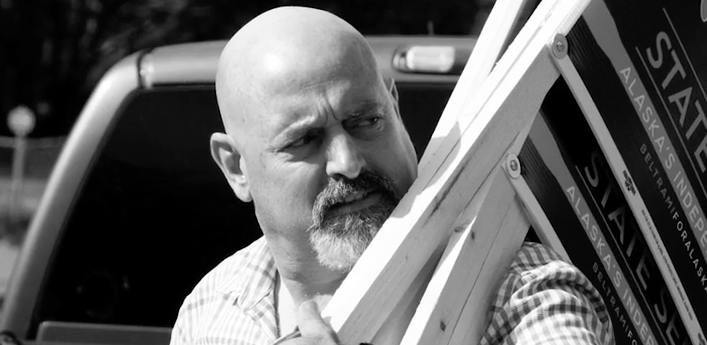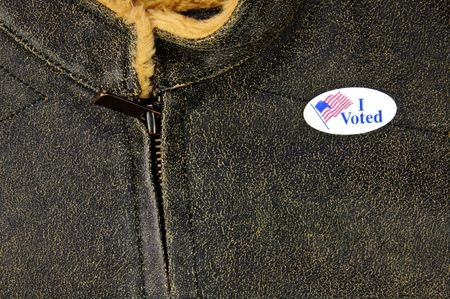
Alaska Congressman Don Young prevailed like a boss over Democratic challenger Steve Lindbeck during Thursday’s Alaska Forest Association / Resource Development Council Forum.
Compared to debates on the national level, the exchange was positively civil. Only friendly jabs were thrown and the two men, who have known each other for decades, landed no big punches.
In fact, during the forum at the Captain Cook Hotel, Lindbeck agreed with almost all of the positions espoused by Young, with the exception of these:
- Lindbeck feels Young should have intervened in a private contractual matter involving escort vessels in Prince William Sound. Rep. Young said it would be an ethics violation to try to pick winners and losers in the business-to-business dealings of Alyeska Pipeline Service Company.
- Lindbeck believes that Hillary Clinton will be elected president and that if the former journalist wins Alaska’s only congressional seat he’ll have access to the White House. Young feels that the majority of a congressional representative’s job is in Congress and he hopes Hillary Clinton doesn’t win.
- Lindbeck said the Pebble Mine is a bad project. The mine was prevented from proceeding with an application for permits by an overreaching Environmental Protection Agency and Lindbeck admitted that the EPA had exceeded its authority. Young offered no opinion on the project but said he is mad that the company was denied its due process: It wasn’t even allowed to present its plans for evaluation.
OLD GUYS MATTER
Both candidates think the other is too old. Lindbeck said: “Forty-three years is a long time to get a lot of post offices named.” He wondered rhetorically why Young had not fixed all the problems he identified with the EPA, federal overreach, and the Endangered Species Act. “It’s not rocket science. I don’t think it’s impossible to figure out how to work in Congress. I will represent Alaska’s interests by working with everyone.”
Young joked that Lindbeck was getting a late start at the ripe old age of 61: ” If you were elected you…wouldn’t be chairman of anything for 20 years, and you are a little long in the tooth for that.” He left it alone that Lindbeck was conflating him with former Sen. Mark Begich, whose only bill ever passed was to name a post office. Of the 77 bills that Young has gotten passed, not one named a post office or courthouse.
“I do work with everyone,” Young added, offering as proof that he is one of the top four lawmakers in Congress for getting legislation passed.
FIXING IT FOR THE UNION
A theme Lindbeck returns to time and again in his campaign is Alyeska Pipeline Service Company’s inking of a 10-year deal with Louisiana shipbuilder Edison Chouest to escort tugs in Prince William Sound. Lindbeck is upset that Young did not intervene and keep the contract with Crowley.
However, Crowley did not bid on the contract when it came up for renewal. It’s a contract it had held for decades.
Lindbeck has made that grievance a centerpiece of his campaign. “This is Alaska oil going through Alaska waters. We cannot make our economy stronger if we outsource the jobs to other companies. I will stand up for Alaska workers.”
Edison Chouest is based in Galliano, La. fully 600 miles closer to Alaska than Jacksonville, Fla., where Crowley is headquartered.
The matter really boiled down to this: Edison Chouest is a nonunion shop. Crowley is union. Lindbeck won the support of the union representing the Crowley workers.
IF THEY VISIT, THEY’LL UNDERSTAND US
Lindbeck offered that the way to get federal cooperation is to make sure that decision makers in DC understand Alaska. He would bring other representatives and officials to see the state for themselves, as then they would understand the size and potential for resource development.
Without acknowledging the irony, he mentioned the John Sturgeon case is an example of how federal officials should have helped a stranded hunter get safely home, rather than cite him for navigating a river in his air boat.
Of course, having federal officials on the ground in Alaska did little to help curb their appetite for overreach in the Sturgeon case, when Park Service officers harassed rather than aided a hunter, but Rep. Young let the opportunity pass to slap at Lindbeck’s logic. He didn’t need to: The audience already had identified the cognitive dissonance.
NO PEBBLE FOR LINDBECK
Finding the proposed Pebble Project the “wrong mine in the wrong place,” Lindbeck waffled on the proposed Donlin Mine, saying he would be interested to know if the local people think Donlin is the right project for them: “We’ll wait and see what the people of Southwest Alaska decide,” he said.
Donlin has received little of the negative attention that Pebble received, possibly because the proposed mine is on Native-owned land, while Pebble is on state-owned land. Environmental groups may be averse to taking on a Native corporation for political reasons. The mining project is located in the Calista Region and has one of the largest known undeveloped gold deposits in the world.
Young said that federal permitting roadblocks and overreach, such as the Environmental Protection Agency pre-emptively ending the permitting process on Pebble, is a deterrent for investment in Alaska. That likely was the position of 99 percent of the audience at the Resource Development Council.
CLOSING THE SALE
In his opening statement, Lindbeck said, “I come to you as an Alaskan Democrat, in that order. I will work with whoever it takes to get things done on behalf of our state. As you can imagine, I will be taking issue with my party on some issues.” He supports opwning the Arctic National Wildlife Refuge to hydrocarbon development. He supports Outer Continental Shelf drilling. He supports mining, but not the Pebble mine. He wants enough timber harvest in the Tongass National Forest to keep a small industry alive.
In his closing statement, Lindbeck was gracious in thanking the organizations for the opportunity to debate, while Rep. Young passionately asked the audience for their vote:
“This is about the Congress, and whether we have a freshman or a senior, a fighter or a beginner,” he said. “I’m the one who will speak up and has done the job and will do the job. I’ve still got the fire. Alaska is my home, and Alaska is my pride. I will fight for you side by side. I’ve put my hands in traps, I have been somewhat aggressive at times. But I do it because I believe I am the best person for this job all the time.”
“I am your fighter and because of that I believe you will vote for me,” Young said. “I do it because of my friendship, my compatibility, and yes sometimes as I mentioned, I’m different. I am a fighter. I’ve always been, I always will be. I’ll never give up. Perserverance overcomes intelligence and I’m a classic example of that.”






 Gary Johnson was the 29th governor of New Mexico from 1995 to 2003. He was a Republican. He was the Libertarian Party’s nominee for President in 2012.
Gary Johnson was the 29th governor of New Mexico from 1995 to 2003. He was a Republican. He was the Libertarian Party’s nominee for President in 2012. Alaska always has some charismatic personality who rolls into the state, captures the imagination of many and ascends to power before crashing spectacularly.
Alaska always has some charismatic personality who rolls into the state, captures the imagination of many and ascends to power before crashing spectacularly. Today’s Bill Allen might very well be Vince Beltrami: Smooth talking, affable, thoroughly believable, just like Allen. And determined to own the Legislature.
Today’s Bill Allen might very well be Vince Beltrami: Smooth talking, affable, thoroughly believable, just like Allen. And determined to own the Legislature. Vince Beltrami was elected to his post as president of the AFL-CIO in 2006.
Vince Beltrami was elected to his post as president of the AFL-CIO in 2006. Politics
Politics




 DONALD J. TRUMP
DONALD J. TRUMP Mike Pence is a former six-term U.S. congressman from Indiana and current governor of Indiana. In 2016 he was chosen as the Republican vice presidential nominee on Donald Trump’s ticket.
Mike Pence is a former six-term U.S. congressman from Indiana and current governor of Indiana. In 2016 he was chosen as the Republican vice presidential nominee on Donald Trump’s ticket.




